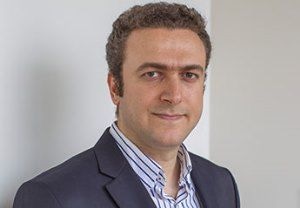Jun 16 2016
UCLA researchers who are developing technology to address air pollution and vision loss, respectively, have been named 2016 Vodafone Wireless Innovation Project winners.
 Aydogan Ozcan, Chancellor's Professor of Electrical Engineering and Bioengineering. (Credits: UCLA)
Aydogan Ozcan, Chancellor's Professor of Electrical Engineering and Bioengineering. (Credits: UCLA)
The prizes are awarded each year by the Vodafone Americas Foundation to researchers whose work is aimed at solving critical issues facing the world today and driving social impact through mobile innovation. The two UCLA teams, which tied for second place in the Vodafone competition, will each receive a $200,000 award for research and development of their projects.
Aydogan Ozcan, Chancellor’s Professor of Electrical Engineering and Bioengineering at the UCLA Henry Samueli School of Engineering and Applied Science, and his research group have developed a cost-effective technology platform, called c-Air, to accurately map the sources and dispersal patterns of air pollution. C-Air is a lightweight sensor that integrates computational imaging and mobile-sensing techniques, permitting on-the-ground and drone-based 3D mapping of emissions from pollution sources such as highways, airports and factories.
Ozcan’s lab was also a winner at the inaugural Wireless Innovation Project in 2009 for a lens-free imaging platform that attaches to a cellphone and can be used for disease detection and diagnostics.
Navid Amini, a research faculty member at the UCLA Stein Eye Institute, led the development of EyeSee. This assistive technology combines a smartphone and a compact head-mounted display to maximize residual vision and enable independent living for people with diminished eyesight, including stroke victims with hemianopia, decreased vision or blindness after a stroke. EyeSee is the first electronic vision enhancement tool for hemianopic visual field loss. EyeSee’s Phase I clinical trial is ongoing.
Prior to his faculty appointment, Amini was a postdoctoral fellow at the UCLA Stein Eye Institute. He earned his Ph.D. in computer science from UCLA.
Since its inception in 2009, the Vodafone Americas Foundation Wireless Innovation Project has awarded $4.9 million to researchers at U.S. universities and nonprofit organizations.